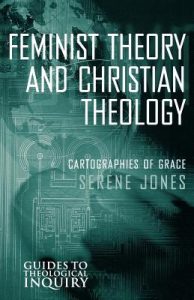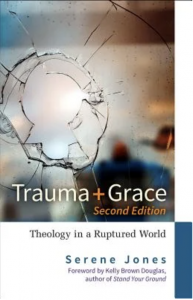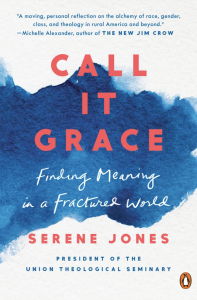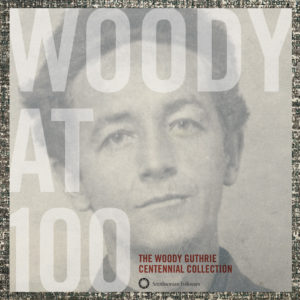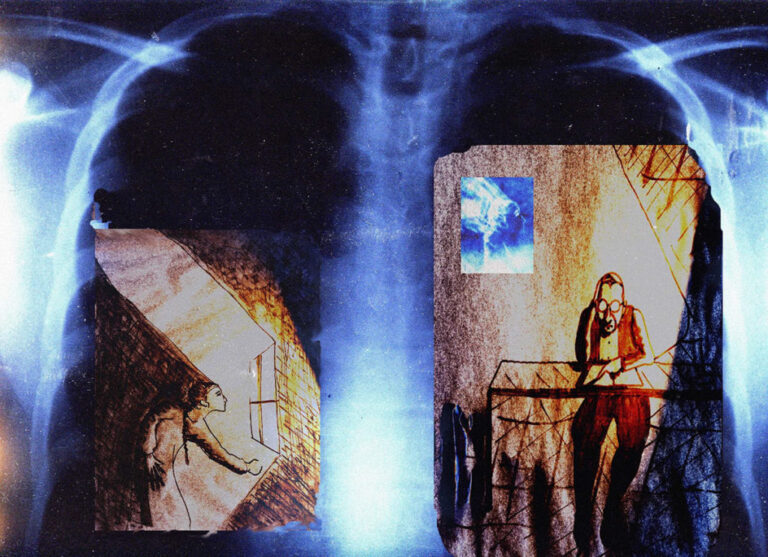Serene Jones
Grace in a Fractured World
The glory that coexists in human life right alongside our weird propensity to choose what is not good for us; the difference between a place of sheer loss and a sacred space for mourning; grace as something muscular amidst the muck and mess of reality. These are some of the places of musing, sweeping perspective, and raw wisdom a conversation with Serene Jones takes us. And after hearing this, you’ll never think in the same way again about Woody Guthrie, or John Calvin, or what a Christian upbringing in Oklahoma might be.
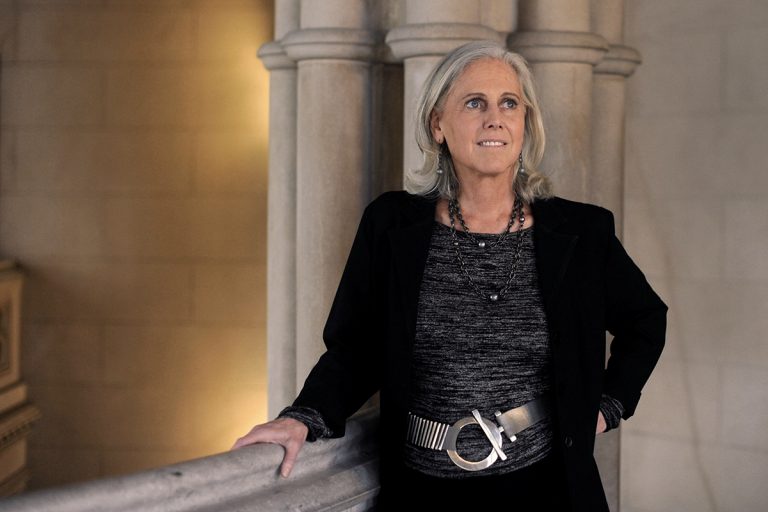
Image by Darren Ornitz, © All Rights Reserved.
Guest
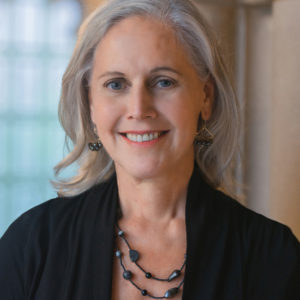
Serene Jones serves as the 16th president — and the first female president — of Union Theological Seminary in New York City. She is a minister ordained in the Disciples of Christ and the United Church of Christ. Her books include Trauma and Grace: Theology in a Ruptured World, Feminist Theory and Christian Theology: Cartographies of Grace, and most recently, Call It Grace: Finding Meaning in a Fractured World.
Transcript
Krista Tippett, host: The glory that coexists in human life right alongside our weird propensity to choose what is not good for us, the difference between a place of sheer loss and a sacred space for mourning, grace as something muscular amidst the muck and the mess of reality, repentance as a communal walk towards a different future — these are some of the places of musing and sweeping perspective and raw wisdom a conversation with Serene Jones takes me, and you. She is a theologian of trauma. She is president of the premier American place which gave us public theology in the 20th Century, that is now being utterly rewritten for the 21st. And, after hearing this, you’ll never think in the same way again about Woody Guthrie, or what a Christian upbringing in Oklahoma might be, or the theologian-reformer John Calvin.
[music: “Seven League Boots” by Zoë Keating]
I’m Krista Tippett, and this is On Being. Serene Jones is the 16th president of Union Theological Seminary in New York City, and the first woman in this role. Full disclosure: she is a friend with whom I share an unlikely convergence of life trajectories. We recorded this at Chautauqua, in the 2019 summer season. As you’ll hear, it was a stormy day in the historic outdoor amphitheater.
[applause]
I was reading an interview someone else did of you, and the question was, “A classic form of Christian memoir is, ‘I once was lost, but now am found’” — which is also the hymn, the context in which I think the word “grace” comes, for so many of us, most readily. So someone asked you, “‘I once was lost, but now am found.’ Does your story translate into any version of that?” Do you remember this?
Rev. Serene Jones: Yes.
Tippett: And you said, “I once was a happy but confused Christian child. Now I am a wiser, still fundamentally happy, yet humbled Christian leader — humbled by life and by my own understanding of the complexities, horrors, and gifts of the Christian faith.”
I wonder if you would, Serene, just — how would you start to begin to describe the religious and spiritual background of your childhood, which, as you’ve described it — I was watching a speech you gave at the Disciples of Christ annual convention — that you came from a staunchly Disciples household.
Rev. Jones: So you’re right; in writing, we discover so much about what we think and who we are. And in writing the book Call It Grace …
[thunder cracks]
[laughter]
[applause]
OK, I’m not gonna say anything else from here on out. No. [laughs]
I started to write a book that was explaining theology to people who didn’t have theology backgrounds, and I discovered that I couldn’t talk about theologians without telling the story of my childhood. And that’s where it begins.
And I grew up in a thoroughgoingly Christian church, Disciples of Christ world. My father was a minister and a theologian. Our church was the center of our life. And I had the very, I think, wonderful advantage of growing up in a progressive Disciples community. So it was where I learned, from the time I could walk, about social justice and racism and what it meant to be “church.” And I also, there, learned about grace. And from the time I heard the word “God,” I thought, God means love, and love is universal, and we are all loved — that’s grace.
Tippett: And your father was a theologian and, eventually, a seminary dean. So you really did grow up in the bosom of the church, at every level of your family life.
Rev. Jones: Yes.
Tippett: There’s a lot of talk, these days in the world, about the difference between what is spiritual and what is religious. But Serene — the distinction that Serene is passionate about is the distinction between religion and theology. And we’re rediscovering the power of story, in this culture. And you also say this about the move that theology makes, which is, it’s not the mere telling of our stories and our truths. You said, “We can tell our stories till the day is done and then wake up tomorrow and tell more of them. That’s not a challenge for us. The challenge is using our stories to explore the questions: So what?”
And the particular world of theology that you grew in and that informs you is, you call, “prairie theology.” So you and I have known each other for a number of years, and one thing that’s really important that we have in common is that we both grew up in Oklahoma. Serene grew up in the small town of Billings, and I grew up in the small town of Shawnee, both of us steeped in church — yours, progressive Disciples of Christ, mine, conservative Southern Baptist. So there’s a way in which the religiosity of our childhoods was similar and ways in which it was very different.
I do want to read — you talked about — yeah, the theology of your childhood, and Reverend Larry, who preached about greed. You talked about, one Sunday, “Reverend Larry preached that ‘the sin of greed is the greatest of all,’ and then he moved on to talk about how “the early disciples had shared everything, giving to each according to their need.” And he said, “‘I know it’s not popular to say so these days, but Jesus’s early disciples were’ — he leaned forward to confidentially share with the congregation at the end of the sermon — ‘…they were communists.’” [laughs]
[laughter]
“My kid brain had no idea what ‘communists’ meant, but I got the bigger point. We were supposed to share what we had. For me, that meant giving 20 cents of my weekly dollar allowance to the church as my tithe against poverty.”
So tell some of that story. It’s part of your story, and it’s part of our story as a country.
Rev. Jones: And one of the reasons I decided to start the book with the story of my family coming to Oklahoma is, it is a microcosm of all of the conflicts and contradictions of our country today. It’s all there. So my father’s mother, her family came on a wagon train from Pennsylvania, and they were Sooners. And they got on horses and grabbed the flag and homesteaded in Billings. My father’s father’s family came from Tennessee, on the first train to stop in the small town of Okemah, and they were running from the law.
[laughter]
My uncle had killed a man and stolen his horse, and stealing a horse was worse than killing a man because it destabilized the whole community. So aunts, uncles, everyone, had to get on the horse and come, get on the wagon train and come because of that horse. And so I use this meeting of these two different worlds, one, this staunchly Disciple, homesteading couple, and these renegade outlaws; and in that mix also enters my great-great-grandfather, Redman Brown, who was Cherokee, whose family came on the Trail of Tears, the mass genocidal march from North Carolina, where my great-great-great-grandmother, Mary Brown, never left her home, actually, in Cherokee, North Carolina.
But then it all sort of comes together, for me, in a very troubling story that I think is key to our nation, one that literally knocked the breath out of me. I still remember, to this day, when it hit me. I was in a classroom at Yale, leading a search committee — I was the chair — for a new position in African-American religious thought. And the person was giving the lecture; behind him were pictures from postcards of lynchings. And as I sat there looking at these postcards, suddenly, one dropped. And it was of a young woman, lynched from a bridge. You couldn’t see in the frame her son who was next to her, who had also been lynched. And at the bottom it said, “Laura Nelson, 1911” — it’s hard to even talk about — it said, “Okemah, Oklahoma.” And my world just, inside me, imploded. There were maybe 300 people in the town in 1911, and two-thirds of them were my family. [Editor’s note: According to U.S. government records, the town of Okemah had a population of about 3,000 in 1907.]
Audience member: Oh, wow.
Rev. Jones: So there was no way that my family did not know or, most likely, participate in —
Tippett: But it’s not a story that had been passed down.
Rev. Jones: And if they had not participated, they would’ve told the story.
Tippett: So there’s that —
Rev. Jones: So there’s America. There is the whole of it.
Tippett: Well, right; and — and you tell some stories, also about Oklahoma, that I learned after I left home, not at home, that — who remembers this? — that in 1914, seven years after Oklahoma’s official formation, there were 175 registered socialists elected to state and local offices. It was the most socialist state in the nation.
Rev. Jones: And what people don’t know is, a lot of those were Southern Baptists.
[laughter]
It’s true. It’s true!
Tippett: Because it was a merger of Christianity and the gospel — and so all the complexity of this country, in microcosm.
Your distinction between religion and theology you illustrate, also with a defining moment, where you were at Christian camp in the summer, which — I didn’t know that anybody in the world grew up without going to Christian camp in the summer. This was a shock to me, when I left home. And you were singing a Woody Guthrie song — you don’t have to sing it. I’m not gonna make you sing it. And it’s “This Land Is Your Land,” which is a song also, I think, whether you went to Christian camp or not, you probably grew up singing if you were born 50 years ago. But you learned — you sang the first verse, and then you sang the second and third verses, which also tells this complicated story of us.
Rev. Jones: Yes, that was — sitting around the campfire and then hearing this familiar song with two — it’s like singing a beloved hymn and suddenly discovering that you’d only been singing a fraction of the song, and the hard parts were lopped off. So these were the verses — so first, we sang, [sings] “This land is your land, this land is my land, from California to the New York island” — I’ve never sung in public before.
[laughter]
Tippett: [laughs] [sings] “This land is made for you and me.”
Rev. Jones: Yes, yes — you sing it too. And then the guitar player, a scruffy kid from the late ’60s, sang this: “As I went walking, I saw a sign there, and on the sign, it said, ‘No trespassing.’ But on the other side, it didn’t say nothing. That side was made for you and me.”
[applause]
And then he sings, “And in the shadow of the steeple, I saw my people by the relief office. I seen my people, and they stood there, hungry. And I stood there asking, is this land made for you and me?”
[music: “This Land is Your Land (Alternate Version)” by Woody Guthrie]
Tippett: I’m Krista Tippett, and this is On Being, today with theologian Serene Jones, at Chautauqua.
[music: “This Land is Your Land (Alternate Version)” by Woody Guthrie]s
What I want to talk about is how theology can speak to us and accompany us, as we — you know, one of the ways you’ve talked about — you are upholding this long tradition in American life of public theology. Union Seminary is a place that has cultivated this lineage of public theology. You’ve talked about a calling that is there for all of us now, to be midwives to the world that wants to be born. And even to talk about, say, what does theology have to do with, and what does theological language and questioning — it’s not a fashionable question. And the language of grace could seem wishy-washy. And you really want to claim this as something muscular and absolutely meaningful.
Rev. Jones: Yes, and good theology absolutely must be public theology. What is theology, if it’s not talking about our collective lives, and the meaning and purpose of our lives, and how we’re supposed to live together, and who God is, in ways that are part of our conversation together?
And so, for me, that means that theology is always very personal. If you believe in the grace of God — for me, it’s the notion that we are saints and sinners — that sin part really has, I think, important both personal and collective implications. But if you can’t make personal sense out of that, it doesn’t have any meaning. If it doesn’t weave into the story of your life, it’s just meaningless chatter. And similarly, if you really believe this stuff about grace, if you really believe God loves everybody and the world, and forgives, ultimately, in mercy, everybody, it profoundly affects your politics. It affects how you engage everybody; how you look at them, how you walk through life. It’s thoroughly political, and in both the intimate and the political ways, it’s public.
Tippett: So you do bring the personal and the political, the intimate and civilizational together as you think and walk. You also are accompanied by this lineage of great theology and great theologians. I first encountered you — we actually were at Yale Divinity School at the same time, but we never met because Serene was the star, the rising star doctoral student, new professor, and I was just a lowly student.
Rev. Jones: Not true.
Tippett: And John Calvin is really important to you. And you’ve said, “It is impossible to understand even the most basic things about Christianity in America without plumbing the depths of the theological book where much of it originated.” So I wonder if you would just introduce John Calvin as a voice for the 21st century.
Rev. Jones: Well, I have to say that as people have read this book — and there’s many quite dramatic stories in it, but time and again I hear that the thing they find the oddest is that I actually like John Calvin.
[laughter]
And I do. I do. I think his theology is profound. And it is at the root of the story we tell ourselves. So he believed in the sovereignty of God, which for him meant that there is nothing that we can say or do or live, or places we can go, or interactions we can have that don’t unfold before God, and that God sees us and loves us, and that’s why we’re here. And the complicated character of human life is that, on the one hand, God creates us to be glorious — gives us powers of intellect and love and connection and art, and we’re capable of amazing, extraordinary accomplishments.
And yet, right next to this glorious side is this weird propensity that human beings have to choose what is not good for them — to choose evil, to sin, to close their eyes to the love of God and their own glory, and to become harmful and self-destructive and destructive of others. And life is the struggle of those two realities within us. And they never go away. It’s not like you get over the sin part and become glorious; it’s not like you’re ever only sinful. That is the complex nature of who we are.
Tippett: I want to draw you as a theologian, as a public theologian, on the challenge of life in our time, life in this country, and how a theological point of view — and perhaps John Calvin will continue to walk with us, or some of the other theologians who you walk with. One thing you’ve written about — I mean, just how do we come at this moment through a theological lens — one of the things you’ve thought a lot about is the notion of trauma, and trauma and grace. And I feel like as much as we analyze and investigate and try to name what’s going on in our world, there’s this huge way in which this is a moment of human trauma all around, whether you are on the prairie or in the inner city or in the Appalachian hills. How would you want to bring that into relief as something we can work with directly, as opposed to something that’s always going on beneath the surface and that we cover up with political fights and alienation; really fear?
Rev. Jones: Well, one of the things that I learned from life, but it came to the fore in writing the book on trauma, is that not just individuals but whole communities undergo trauma, and that one of the characteristics of trauma is the deep human desire to repress it and to not deal with the story of the harms that have happened. But the truth of the matter is, with individual and collective trauma, is that the harm haunts you — haunts your dreams as an individual, haunts your collective unconscious as a society — until you tell the story; till you face the truth of the horrors that have happened. And I think what is happening in our nation today is, all of the harms of the past have come up to claim us, all at once, and they’re not gonna let us go until we take the stride of reckoning with them.
But we’re terrified of doing that. And I think — and my understanding of grace has allowed me to think a lot about why, for white people, that’s scary, for myself. And that has led me on a journey into the construction of whiteness in the United States. When we talk about chattel slavery and the history of racism, we spend a lot of time talking about what slavery was like and how African-American identity got constructed, but we spend very little time talking about how white people became white. That had to be made up too.
Tippett: Your Cherokee grandmother — great-grandmother — what was it — that when the Jim Crow laws came into being in Oklahoma, they declared themselves as “pure white.” And there was a moment that you actually have — that’s unusual; and you have the pictures, and you have the documentation, and you know the story — at which they became — yeah, that was the language, “pure white” — from one generation to the next. And it was a leap of the imagination, and it was a kind of formal process.
Rev. Jones: In Okemah, when Jim Crow came down, they owned property, but because Redman Brown was Cherokee, they couldn’t own it unless he signed a paper saying that he was not Cherokee, that he was “pure white.” And so we have the actual story of whiteness happening in our family.
But what’s interesting to me too, though, is as I’ve talked to people about the story of Okemah and the lynching, is I think that in the stories of white supremacy, liberal white people today want to put that in the past and not reckon with how close it is to who we are now. And for me, I wasn’t allowed that dangerous innocence, once I saw that postcard. But I think, for this moment in time, just the courage to be honest. And the second thing I’d say about this political moment — and it’s a deeply theological claim — is, I honestly think at the heart of our nation’s turmoil is the fact that people honestly do not believe that we are all equal and loved equally and equally valued. They just don’t believe that.
[applause]
And that crosses the aisle. That crosses the aisle. And that’s a theological issue.
Tippett: And it’s a theological issue, and I also feel like it’s something where, on our scientific frontiers, we’re actually understanding better that it’s natural. And it becomes a form of power, to say, “Now we know this — that this is what our brains naturally do, especially when we’re afraid — and we can change.” Right? It’s that self-knowledge that Calvin calls you to.
A couple of things that this brings to mind for me. In your trauma work, you talk about that grief — the terrible things that happen to us, the losses or the things that we have to acknowledge, that this whole American thing of “resolution,” that’s not a theological move, and it’s not actually reality-based. But you say there’s something that can happen when grief becomes mourning — that that is a different move.
Rev. Jones: Yes. In trauma, when one is able to come to grips with what happened — not resolve it, not fix it; most traumas live with us in indelible ways — but to move from grief from mourning is to move from a place of sheer loss to a place of acknowledging the loss. And in mourning the permanence of the loss — it can’t be fixed — but also it creates a space, in mourning, for you to make sacred the pain so that the rest of your life is transformed by it. It allows the possibility of a future, mourning does. Pure grief just locks you in, in the eternal present. And mourning gives us a chance for collectively …
Tippett: And I think that, also — boy, to get to the subtleties and the nuance of this is, it’s also possible, in this moment where we have varying degrees of awakening to, you might say, our national sins, that to just decide to grieve it is also not to go far enough; that that’s also a way to get locked into it or to — right.
Rev. Jones: Well, you can grieve it. You can be ashamed of it. You can be embarrassed by it. You can be horrified by it. But until those things are transformed into what I call mourning — which is the recognition of it in a space that still allows for a future — that grief, that denial, that shame just stops the possibility of actually engaging and transforming the things that created those horrible conditions, and we’re stuck. And until we can get unstuck — and that shame needs to loosen its grip, or that denial about the past. As if somehow — it’s a strange fear that somehow, if we come to grips with those horrors, we’re somehow gonna die from them. And that’s simply not true. You’re set free, actually, by the telling of the truth. That was true for me, even in my own personal family story. And you can move into a place where it is something that you can find a place for in your soul and in your heart, but not in such a way that it immobilizes you, but it actually propels you into the future, through love.
[music: “Amazing Grace” by Marisa Anderson]
Tippett: After a short break, more with Serene Jones.
[music: “Amazing Grace” by Marisa Anderson]
I’m Krista Tippett, and this is On Being, today with theologian Serene Jones, recorded on a rainy day in the historic outdoor amphitheater during the 2019 Chautauqua summer season. Since 2008, she’s been president of Union Theological Seminary — the first female leader in its 179-year history. Union was an intellectual and spiritual home to towering figures of the 20th century like Reinhold Niebuhr, Paul Tillich, and, for a time, Dietrich Bonhoeffer. We’re exploring how the human enterprise that is theology might offer a clarifying lens on the present.
So “repentance,” it’s another great theological word. And the Greek root of it is very active and visual. It’s about stopping in your tracks and walking in another direction. One thing that you’ve said is that repentance does not require individual culpability, and also that individual culpability is not enough — that repentance is also about how a community owns and understands the reverberations of its actions and its realities.
Rev. Jones: Repentance — it’s a powerful word, as you said, and it really means to walk in a different direction. It means to do it differently.
Tippett: It’s not just a change of heart.
Rev. Jones: It’s also not just saying, “Oh, that was horrible. I’m so sorry.” It’s much more than “I’m sorry” or “ That makes me so uncomfortable, and I’m sad that happened.” It’s really saying, “That is horrible. And this is the path that we’re going to walk on together to fix it.” Not fix it in the sense of “cover up the past,” but fix it so that the horrors that hold us don’t keep happening. And so that active grasping, walking towards a different future, has to be done together. It’s not just me deciding, “Oh, Serene, now that you’ve come to grips with your horrible past, you’re gonna walk out there and fix it and walk in the right direction,” because the things that bind us are not just ours alone, but they’re ours as a whole society. So if we don’t walk collectively, we’re not getting at the chains, the sins, that hold us down.
Tippett: One of the — well, let me just say, one of the things you say is that “Grace is more original than sin.” And given everything that we’ve been talking about, how does that work?
Rev. Jones: Well, this is where the grace part becomes so important, because in my theology — and this is part of what we need to reclaim; it is so deep in Christianity — is that we may be glorious and sinful, but God’s love is bigger than that. So the reason we, in repentance, walk in this direction is not because, as sinners, we’ve repented, and because we don’t want to go to hell and want to go to heaven, we’re gonna walk that way. It’s because you actually recognize that the truth of love points you in that direction.
Grace is more original, because grace wins. Our sinfulness is not the final word about who we are. And that means that in this theology, which is suffused through Christianity and we suppress it, is that the love of God, the love of the universe, spirit, however you describe it, is stronger and more powerful and persistent, larger, greater, more eternal, than anything we do. That’s grace. And that’s the grace that changes how we experience everything.
[applause]
Tippett: And I guess the question — how do I want to ask this question? It was a much simpler thing, in the mid-20th century, for a Reinhold Niebuhr to say things like that, in a country that was overwhelmingly Christian, overwhelmingly Protestant, and for it to be clear that this kind of thinking and reflecting, and this kind of wisdom about the human condition, as much as about whoever or whatever God is, belonged in the center of our life together. And I know this is a question you ask. How do you talk about why it’s — not just, I think, still right, but really necessary that public theology also find its place in our world? And also, how is that gonna be different from Niebuhr and Tillich and Bonhoeffer, all those people who were, once upon a time, also at Union Theological Seminary?
Rev. Jones: Well, they all share several things, but they had come from German background; they were white men; they existed in a certain generation and were influenced by the same philosophers and underlying German existentialism. And today, that conversation has to be done in an interfaith context, because Christianity’s refusal to engage other religions seriously and with grace and graciousness is one of its greatest sins that we can no longer allow.
[applause]
And it has to be done by all of the voices, not just the white male voices that made Union famous in the ’30s, ’40s, and ’50s. It’s the voice of James Cone and Beverly Harrison and Delores Williams and Gary Dorrien. It’s the voices of Greg Snyder and Jerusha Lamptey, Buddhist and Muslim. It’s those voices together. And I think — and this is perhaps the most radical thing of all — I think that what is emerging, I feel it like an earthquake underneath us — is it feels to me like we’re in the middle of the Reformation. But people in the middle of the Reformation didn’t know it. It was only afterwards. And they couldn’t have imagined what was going to come. We’re in the middle of that. It’s like, something is coming that completely rewrites the story of who we are.
Tippett: But what they knew in the moment, which is what we know, is everything is falling apart.
Rev. Jones: Everything is falling apart, and something new is emerging.
Tippett: Right.
[applause]
Rev. Jones: So the crumbling and that. And the new can’t emerge without the old breaking down. But it’s — so turn a moment of fear and terror into a moment of exuberant hopefulness. And for me — I just turned 60, two weeks ago …
[applause]
… I realize that it’s my work to do, but I’m not going to be here to see what comes. And that’s OK. But we got a lot of work to do in these next years, all of us together, even if we don’t know where we’re going.
[applause]
Tippett: I’m Krista Tippett, and this is On Being, today with theologian Serene Jones, at Chautauqua.
Emily Morris: While the rains come, we’ll move to some questions and hear from our audience. “We’ve talked a lot, this week, about reckoning. Is there a relationship between grace and reckoning?”
Rev. Jones: So grace is — and again, here I’m sounding very traditionally Calvinist and Christian, but grace is God’s reckoning with us, and it’s already happened. It’s already happened. God created us, and we are loved. The thing I don’t like about the term “reckoning” is, it can play into old Christian notions of the reckoning that you must have, or you’re going to go to hell. So there’s a sort of threat character to it. Reckoning as I understand it, in a political and social context, is yes, we will go to hell; meaning, we will continue to live in the hell that we’ve created, if we don’t reckon with the past.
[applause]
Morris: A couple of weeks ago, we had the pleasure of spending time with Father Richard Rohr. And one of the things he said that week was that if you do not transform your pain, you will transmit it. And a member of our audience asked the question, “How does mourning transform our grief into grace?”
Rev. Jones: So there’s so many moments of pain and trauma in my own story. And at one point, it became clear to me in my life, as I was — it became most clear when I was going through a divorce and felt I had failed to keep my own covenants; how could I believe that God kept covenant with me? And I was having a hard time forgiving the man I had been married to. And I realized that the hatred and the trauma and all of these things that we carry with us, we’re not afraid to let go of them because they’re so painful. We’re actually afraid to let go of them because they’ve become so comfortable. They become like — our injuries can be like warm blankets that we wrap around ourselves, and our grief and our pain and our trauma. And they stop us, if we wrap them tightly enough around ourselves, from feeling vulnerable to the world.
And I came to see that until I was willing to let go of those blankets of grief and fear and rage and anger and shame, that I actually couldn’t experience the world. And for me, that letting go is a profound description of what forgiveness is, and that’s the moment that one moves from grief into the transformative power of mourning, in the context of having a future.
[applause]
Tippett: I think a lot about the many callings of being alive at this moment in time and that some of the callings — for those of us even for whom justice is such an important call — are to be calmers of fear; to become reflective together; to ask — to open up to questions. These all are very relevant to the work of evolving our humanity, to changing our society, to shifting our politics.
Rev. Jones: And central to that is getting off your own self-righteous pedestal and recognizing that the flaws that you’re wrestling with in everyone else live in you, as well. And we could all use a little bit more humility, if we want to move forward, about our own failings. That changes the whole stage, when you talk about your own brokenness, rather than how you’re right and the people that make you crazy are wrong.
Tippett: So I do want to circle around to love, as we close. And it has — this quote of James Baldwin, who’s in your cloud of witnesses, of theologians, I heard this quote, the first half of it, in the last year. And it really stunned me, and I’ll read it to you now. And you quote this in your book, too. “Love takes off the masks that we fear we cannot live without and know we cannot live within.” So that’s an incredible statement. But what you introduced me to is what he said next. “Love takes off the masks that we fear we cannot live without and know we cannot live within.” And then James Baldwin says, “I use the word ‘love’ here not merely in the personal sense, but as a state of being, or a state of grace, not in the infantile American sense of being made happy, but in the tough and universal sense of quest and daring and growth.”
Rev. Jones: So amazing. You hear James Baldwin, the son of a preacher. And for him, that love that he always saw and grasped for and had hope in — that he called that grace. And what grace grasps is the thing that it’s not just a given. It really is a gift, and it has political force. It’s quest. It’s daring. It’s exploration. And James Baldwin reminds us that if we give up that hope, that quest in love, then we’ve lost. And we can’t afford that. And he never could afford that. And he never gave in to skepticism and cynicism and despair, even though he had every right in the world to do so. He’s one of my heroes.
Tippett: You’ve actually said, as a quick way of describing this moment we’re in: “We are in the midst of a political, spiritual love crisis.”
Rev. Jones: [laughs] Yes. Our masks are falling. We know we can’t live in them anymore. They’re destroying us. But we haven’t yet figured out what it means to live together without those masks. And that’s where the quest, the daring, the exploration — that’s where the bigness of love, as the ultimate truth about the world and our lives, has to be present. I believe that we can’t do it on our own, if we don’t have that guiding force.
Tippett: I think a lot about how the word “love” is also the most watered-down word in the English language at the very same time that it is absolutely what can save us. Right? I mean, “Love is a Subaru.” [laughs]
[laughter]
So I think I want to ask you, in closing, this love as a tough and universal sense of quest and daring and growth that James Baldwin describes, the love — what did King say? “I’m not talking about emotional bosh. I’m talking about a tough, demanding love.” I wonder if you would just reflect on — and I know you walk through the world looking for this. And where do you see — just talk to us about where you see that; what that looks like; how you’re encountering it in the world today, love made public.
Rev. Jones: I see it in so many places around our nation and around the world, where communities are struggling together to improve, collectively, the conditions of their life, whether it be on the border or in Chicago, New York City; in Argentina or Yemen. Love persists. And it’s a remarkable, almost miraculous thing that love persists.
But at Union Theological Seminary, I see a next generation of — many of them young people, but of all ages and many religious traditions, and some with no religious background, racially, sexual identity — just extremely diverse. And they’re coming to seminary because they feel that earthquake too. And they believe in the future and that a better world is possible and that that challenge of reaching it is a spiritual challenge. It’s not just figuring out how to drill a new well. It’s figuring out how to redefine what water is and why we need it and the sustenance. And so the fact that a place like Union is growing and thriving, and people are showing up in the midst of this almost feels like, sometimes, shut-down nation that’s so embattled, they’re showing up, walking through the doors, asking the big questions, and still expecting, hoping, yearning for some kind of future and a wisp of an answer.
Tippett: Thank you, Serene Jones.
[applause]
[music: “Modern Country” by William Tyler]
Serene Jones is a minister ordained in the Disciples of Christ and the United Church of Christ. She currently serves as the 16th president and the first female president of Union Theological Seminary in New York City. Her books include Trauma and Grace: Theology in a Ruptured World, Feminist Theory and Christian Theology: Cartographies of Grace, and, most recently, Call It Grace: Finding Meaning in a Fractured World.
Special thanks this week to Michael Hill, Matt Ewalt, Emily Carpenter, Rachel Borzilleri, and Emily Morris, who moderated questions from the audience.
[music: “Modern Country” by William Tyler]
The On Being Project is: Chris Heagle, Lily Percy, Laurén Drommerhausen, Erin Colasacco, Eddie Gonzalez, Lilian Vo, Lucas Johnson, Suzette Burley, Zack Rose, Colleen Scheck, Julie Siple, Gretchen Honnold, Jhaleh Akhavan, Pádraig Ó Tuama, Ben Katt, Gautam Srikishan, and Lillie Benowitz.
The On Being Project is located on Dakota land. Our lovely theme music is provided and composed by Zoë Keating. And the last voice that you hear singing at the end of our show is Cameron Kinghorn.
On Being is an independent, nonprofit production of The On Being Project. It is distributed to public radio stations by WNYC Studios. I created this show at American Public Media.
Our funding partners include:
The Fetzer Institute, helping to build the spiritual foundation for a loving world. Find them at fetzer.org.
Kalliopeia Foundation, dedicated to reconnecting ecology, culture, and spirituality; supporting organizations and initiatives that uphold a sacred relationship with life on Earth. Learn more at kalliopeia.org.
The George Family Foundation, in support of the Civil Conversations Project.
The Osprey Foundation, a catalyst for empowered, healthy, and fulfilled lives.
The Lilly Endowment, an Indianapolis-based, private family foundation dedicated to its founders’ interests in religion, community development, and education.
And the Ford Foundation, working to strengthen democratic values, reduce poverty and injustice, promote international cooperation, and advance human achievement worldwide.
Books & Music
Recommended Reading
The On Being Project is an affiliate partner of Bookshop.org and Amazon.com. Any earnings we receive through these affiliate partnerships go into directly supporting The On Being Project.





